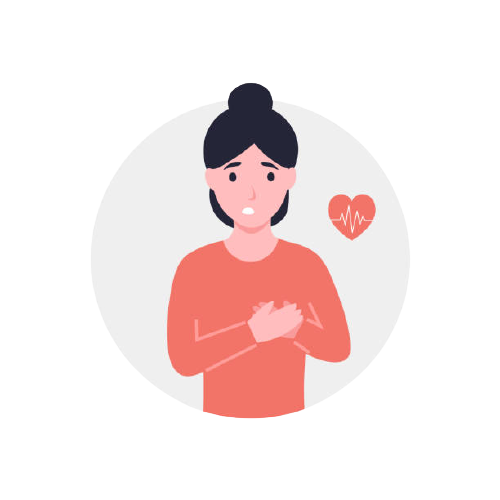Online Palpitations Therapy | Best Therapist for Palpitations Help
- Set up a free & confidential chat on your palpitations issues
- Unlimited help through palpitations self-care app
- Live Video or Chat sessions with top palpitations therapists
Begin Therapy
Consult online with best Therapist
Get the best help for palpitations
TherapyMantra is here to help you on your path to recovery from palpitations. We match you with the best palpitations therapists available 24/7 via video call or messages.
Match with palpitations Therapists
We assign the best counselors experienced in palpitations issues based on your needs.
Affordable and Effective
Our online sessions are 90% less expensive than in-person therapy, available 24/7.
Self-Care for palpitations
We offer ongoing palpitations support through self-care tools, help videos, chat groups, meditations, breathing exercises, and other resources.

Wondering if it’s just a phase or something more? Take our Free online palpitations test to find out?
How it works?
You are matched with a palpitations counselor based on your needs and preferences. You get a secure “therapy room” where you can communicate with your counselor via chat or phone. You can write or talk about palpitations & ask questions to deal with palpitations.

Register for palpitations Counseling
Simply complete a 5-minute online form to tell us about your palpitations issues

Consult with your palpitations Therapist
We connect you with palpitations counselors who are available 24/7 based on your preferences and needs.

Connect to Our App
Apart from Video/chat sessions, our app offers self-care tools, videos, and meditations to help you deal with your palpitations.
Best palpitations Therapists
Positive conversations, exercises, and meditations are used by TherapyMantra psychologists to help you deal with palpitations. Our palpitations therapists outperform traditional counseling as you get matched from a pool of 500+ palpitations counselors, who offer 24/7 unrestricted private chat.








What are palpitations?
Palpitations are the awareness of your heart beating. It is a symptom that can be caused by several conditions. If you feel your heart racing or pounding, then this may also cause you to have palpitations too. Palpitations can range from being an annoyance to being very serious and even life-threatening. Some people experience it more frequently than others.
The number one cause is anxiety, which can be brought on by many factors. Any type of stress, either emotional or physical, can trigger this symptom. Some people experience it when exercising, while others may only have it after having a few drinks or even when they are just sitting quietly.
The good news is that many people find relief from their palpitations by learning how to manage their anxiety. There are also treatments available for those who do not find relief from self-help measures. If you are one of the unlucky few who experience palpitations frequently and they are causing you a great deal of distress, then it is important to see a doctor.
Types of palpitations
There are different kinds of palpitations:
Palpitations are often caused by physical exertion, stress, or an emotional response to a situation. Conditions that may cause palpitations to include the following:
Cardiac arrhythmias can be split into three main groups depending on where they originate from in the heart: supraventricular arrhythmias, ventricular arrhythmias, and atrial fibrillation.
- Supraventricular arrhythmias originate from above the ventricles in the atria. The most common type is sinus tachycardia, which is a rapid heartbeat that originates in the sinoatrial node. Other types of supraventricular arrhythmias include premature atrial contractions, premature ventricular contractions, and atrial fibrillation.
- Ventricular arrhythmias originate from the lower chambers of the heart (the ventricles). The most common type is ventricular tachycardia, which is a very rapid heartbeat. Other types of ventricular arrhythmias include ventricular fibrillation, polymorphic ventricular tachycardia, ventricular flutter, and long QT syndrome.
- Atrial fibrillation occurs when the atria of the heart are not beating in a coordinated fashion. This causes ineffective blood flow and can lead to blood clots.
Treatment Options for Palpitations
There are a few different treatment options for palpitations. Treatment will depend on the cause of the palpitations. Some common treatments include:
- Medications: Medications can help to control the heart rate and prevent further episodes of palpitations.
- Lifestyle Changes: Making lifestyle changes, such as quitting smoking, can help to prevent palpitations.
- Pacemaker: A pacemaker may be recommended if the palpitations are due to an arrhythmia.
- Cardiac Ablation: Cardiac ablation is a procedure that can help to eliminate the cause of palpitations.
If you are experiencing palpitations, it is important to see your family doctor or a cardiologist as the cause of your palpitations could be serious.
How can Therapy help with Palpitations?
Therapy is a form of counseling that can help you understand and manage your emotions. It can also help you learn coping skills to deal with stress and other triggers. If you are experiencing palpitations, therapy may help you identify the triggers and learn how to manage them. This can help to reduce the frequency and severity of your palpitations.
If you are feeling overwhelmed or stressed, therapy can provide you with support and guidance. It can also help you learn how to better cope with stress and reduce those feelings of overwhelming.
There are also other therapeutic benefits as well. Therapy can help you better understand yourself and your emotions, as well as the choices you make. In addition, it can help improve communication skills and stress management – all of which may be beneficial for people living with palpitations.
Therapy Treatments for Palpitations
There are a few different types of therapy treatments that can be used to help treat palpitations.
- One type of treatment is called cognitive behavior therapy (CBT). CBT is a type of therapy that helps you change the way you think about and react to situations that cause you stress or anxiety. This type of therapy can help you learn relaxation techniques that may decrease your stress and anxiety.
- A second type is psychotherapy, which helps you explore thoughts, feelings, and behaviors that may be causing problems in your life. A trained professional called a psychotherapist can teach you coping skills as well as give you strategies to help you change certain thoughts or behaviors that might trigger or worsen your palpitations.
- A third type is pharmacotherapy to help with specific conditions that can cause or worsen palpitations. For example, your doctor may prescribe beta-blockers for anxiety-related palpitations caused by stress. Your doctor might also prescribe atenolol (Tenormin) to slow your heartbeat if you have supraventricular tachycardia (SVT), a type of heart rhythm problem.
- Your doctor may also recommend other treatments, such as electrical cardioversion if you have a more serious heart rhythm problem.
How to find A Palpitations therapist?
TherapyMantra can help you find a palpitations therapist near you. We have over 500+ therapists listed on our therapist directory. You can follow the following steps to find a good palpitations therapist:
- First, ask your family doctor or anyone else you are seeing for a referral for a palpitations therapist.
- The next thing you’ll want to do is ask your friends and loved ones for referrals.
- The next thing you’ll want to do is look online. There are many websites that help people find therapists in their area who can treat things like palpitations.
10,000+ Happy & Healed patients

“After years of dealing with palpitations, Therapy Mantra assisted me in releasing a lot of buried emotions. I had previously received palpitations counseling, which helped, but Therapy Mantra was able to turn me around and make me look forward to a better life.”
Kevin,
1 year on TherapyMantra
FAQs
- Reduce your stress level (via deep breathing and/or relaxation exercises, yoga, tai chi, guided imagery, or biofeedback).
- Avoid or limit your alcohol consumption.
- Caffeine should be avoided or limited in your diet.
- Do not smoke or use tobacco or nicotine-containing products.
If you have severe heart palpitations, it could be a sign of a potentially fatal condition, such as a heart attack or ventricular fibrillation. In these cases, dial 911 right away.
Heart palpitations are usually harmless and go away on their own. However, in some cases, they may be caused by a medical condition known as an arrhythmia (abnormal heart rhythm). Heart palpitations, despite their frequency, can cause anxiety and fear.
If you have frequent palpitations or risk factors for heart disease, such as high cholesterol, high blood pressure, or diabetes, consult your doctor. Palpitations are defined by a racing, rapid, pounding heartbeat that is frequently unpleasant and irregular.
They can be triggered by stress, exercise, medication, or, in rare cases, a medical condition. Although heart palpitations are unsettling, they are usually harmless. They can, in rare cases, be a symptom of a more serious heart condition, such as an irregular heartbeat (arrhythmia), which may necessitate treatment.
Anxiety and palpitations of the heart Anxiety causes heart palpitations, which feel like your heart is racing, fluttering, pounding, or skipping a beat. In response to certain stressful situations, your heart rate may increase. An anxiety disorder may also cause palpitations (excessive or persistent worry).


